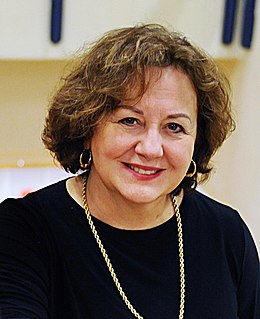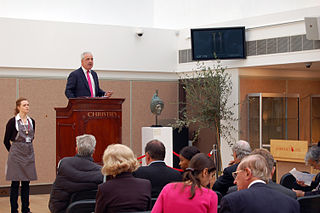
Political sociology is an interdisciplinary field of study concerned with exploring how governance and society interact and influence one another at the micro to macro levels of analysis. Interested in the social causes and consequences of how power is distributed and changes throughout and amongst societies, political sociology's focus ranges across individual families to the State as sites of social and political conflict and power contestation.
In economics, a market is transparent if much is known by many about: What products and services or capital assets are available, market depth, what price, and where. Transparency is important since it is one of the theoretical conditions required for a free market to be efficient. Price transparency can, however, lead to higher prices. For example, if it makes sellers reluctant to give steep discounts to certain buyers, or if it facilitates collusion, and price volatility is another concern. A high degree of market transparency can result in disintermediation due to the buyer's increased knowledge of supply pricing.

Charles Horton Cooley was an American sociologist and the son of Michigan Supreme Court Judge Thomas M. Cooley. He studied and went on to teach economics and sociology at the University of Michigan, was a founding member of the American Sociological Association in 1905 and became its eighth president in 1918. He is perhaps best known for his concept of the looking-glass self, which is the concept that a person's self grows out of society's interpersonal interactions and the perceptions of others. Cooley's health began to deteriorate in 1928. He was diagnosed with an unidentified form of cancer in March 1929 and died two months later.
A financial analyst is a professional, undertaking financial analysis for external or internal clients as a core feature of the job. The role may specifically be titled securities analyst, research analyst, equity analyst, investment analyst, or ratings analyst. The job title is a broad one: in banking, and industry more generally, various other analyst-roles cover financial management and (credit) risk management, as opposed to focusing on investments and valuation; these are also discussed in this article.

Economic sociology is the study of the social cause and effect of various economic phenomena. The field can be broadly divided into a classical period and a contemporary one, known as "new economic sociology".

The sociology of scientific knowledge (SSK) is the study of science as a social activity, especially dealing with "the social conditions and effects of science, and with the social structures and processes of scientific activity." The sociology of scientific ignorance (SSI) is complementary to the sociology of scientific knowledge. For comparison, the sociology of knowledge studies the impact of human knowledge and the prevailing ideas on societies and relations between knowledge and the social context within which it arises.
Viviana A. Rotman Zelizer is an American sociologist and the Lloyd Cotsen '50 Professor of Sociology at Princeton University. She is an economic sociologist who focuses on the attribution of cultural and moral meaning to the economy. A constant theme in her work is economic valuation of the sacred, as found in such contexts as life insurance settlements and economic transactions between sexual intimates. In 2006 she was elected to the PEN American Center and in 2007 she was elected to both the American Academy of Arts & Sciences and the American Philosophical Society.

Harrison Colyar White is the emeritus Giddings Professor of Sociology at Columbia University. White played an influential role in the “Harvard Revolution” in social networks and the New York School of relational sociology. He is credited with the development of a number of mathematical models of social structure including vacancy chains and blockmodels. He has been a leader of a revolution in sociology that is still in process, using models of social structure that are based on patterns of relations instead of the attributes and attitudes of individuals.
Luc Boltanski is a French sociologist, Professor at the School for Advanced Studies in the Social Sciences, Paris, and founder of the Groupe de Sociologie Politique et Morale, known as the leading figure in the new "pragmatic" school of French sociology. His work has significantly influenced sociology, political economy and social history.
David Charles Stark is Arthur Lehman Professor of Sociology at Columbia University, where he served as chair of the sociology department and currently directs the Center on Organizational Innovation. He is also Professor of Social Science at the University of Warwick. He was formerly an External Faculty Member of the Santa Fe Institute. He is well-cited in the fields of economic sociology, social networks, science and technology studies, and social change and development.
Cultural economics is the branch of economics that studies the relation of culture to economic outcomes. Here, 'culture' is defined by shared beliefs and preferences of respective groups. Programmatic issues include whether and how much culture matters as to economic outcomes and what its relation is to institutions. As a growing field in behavioral economics, the role of culture in economic behavior is increasingly being demonstrated to cause significant differentials in decision-making and the management and valuation of assets.
Institutional logic is a core concept in sociological theory and organizational studies, with growing interest in marketing theory. It focuses on how broader belief systems shape the cognition and behavior of actors.

Sociology is a social science that focuses on society, human social behavior, patterns of social relationships, social interaction, and aspects of culture associated with everyday life. It uses various methods of empirical investigation and critical analysis to develop a body of knowledge about social order and social change. While some sociologists conduct research that may be applied directly to social policy and welfare, others focus primarily on refining the theoretical understanding of social processes and phenomenological method. Subject matter can range from micro-level analyses of society to macro-level analyses.

Michèle Lamont is a sociologist and is the Robert I. Goldman Professor of European Studies and a Professor of Sociology and African American Studies at Harvard University. She served as President of the American Sociological Association from 2016 to 2017. A recipient of the prestigious Erasmus award and other prestigious international awards, she has received honorary degrees from University of Ottawa, Université de Bordeaux and University of Amsterdam, University of Warwick, and University of Uppsala. She is married to sociologist Frank Dobbin and together they have three children.

Jens Beckert is a German sociologist with a strong interest in economic sociology. The author of books on inherited wealth and the social foundations of economic efficiency, he focuses on the role of the economy in society – especially based on studies of markets – as well as organizational sociology, the sociology of inheritance, and sociological theory. He is director at the Max Planck Institute for the Study of Societies (MPIfG) in Cologne, Germany, and a member of the Berlin-Brandenburg Academy of Sciences and Humanities.
Cognitive sociology is a sociological sub-discipline devoted to the study of the "conditions under which meaning is constituted through processes of reification." It does this by focusing on "the series of interpersonal processes that set up the conditions for phenomena to become “social objects,” which subsequently shape thinking and thought." Thus, this research aims to sort out the social and cultural contingencies and consequences of human cognition. It has its roots in classical sociological theory, notably Durkheim and Weber, and from contemporary sociological theory, notably Goffman and Bourdieu.

The art market is the marketplace of buyers and sellers trading in commodities, services, and works of art.
Hostile worlds is sociologist Viviana Zelizer's term for the view that the market must be kept separate from intimate, sacred, and otherwise important spheres if they are to retain their value and importance.

Clive L. Spash is an ecological economist. He currently holds the Chair of Public Policy and Governance at Vienna University of Economics and Business, appointed in 2010. He is also Editor-in-Chief of the academic journal Environmental Values.









